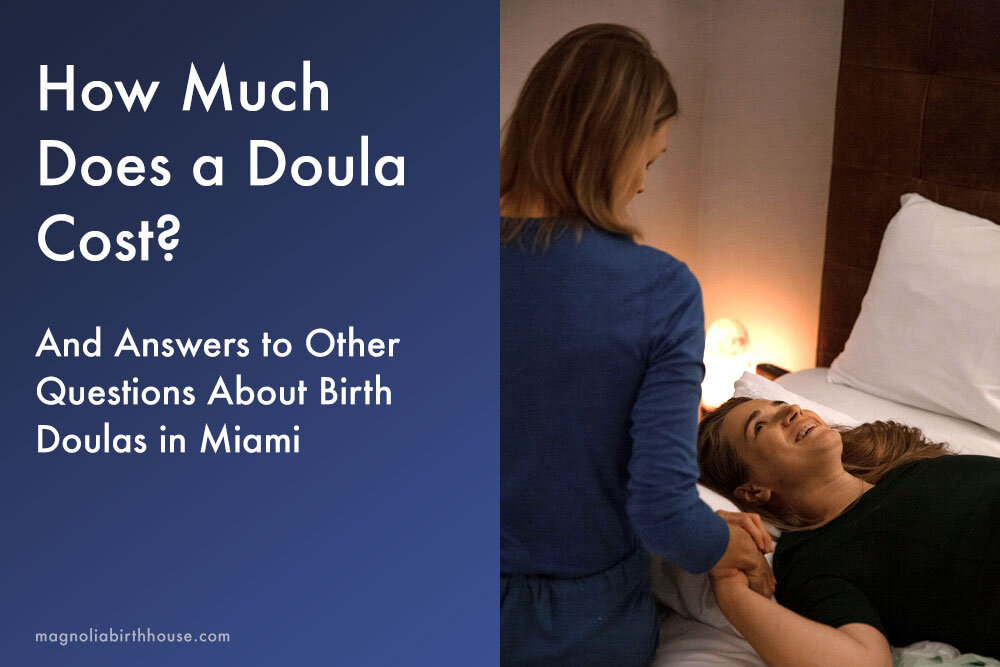At Magnolia Birth House, we believe a doula is an integral part of your birth team. Early in your prenatal care, we encourage you to consider including a doula as one of your support persons.
You may be wondering, “What is doula support?” Well, the word “doula” comes from the Greek for “servant.”
Serving is really the essence of what a labor and birth doula does. She provides emotional, physical, and educational support during labor and birth.
With a new baby on the way, you might feel like your budget is already tight and ask, “How much does a doula cost?”
At Magnolia, doula support is truly a philosophical underpinning, not a talking point, for us. With that in mind, here are the answers to your questions about doula prices, roles, and benefits.
How much is a doula?
At Magnolia Birth House, we never want finances to be a barrier to having a doula. We don’t offer doula services just so we can bill you for something else. We do it because it’s deeply woven into our approach and a huge part of our holistic care.
We remove barriers to having doulas because we fundamentally believe that an ideal birth team has a doula. We have a close partnership with our sister company, The Gathering Place, and its nonprofit, Project Motherpath. We are able to provide 100 percent of Magnolia clients with doula support, regardless of budget, with both newer and more experienced doulas.
The first thing you need to know about doula cost is that there is no fee to interview doulas from The Gathering Place.
Locally, the fee for Miami doula services varies depending on years of experience and expertise. The average cost of a doula ranges from $500 (brand new doula) to $3,000 (seasoned doula plus concierge services). Postpartum doulas charge hourly, and their prices could be anywhere between $20-45.
Why do I need both a midwife and doula?
When you are a client at Magnolia, midwives provide more holistic care than the medical model and are more invested in you personally than a typical doctor. Still, midwives are responsible for your clinical care, and their first priority is the health of mothers and babies.
Doulas, however, make positioning recommendations, offer encouragement, and provide comfort measures, such as massage, acupressure, and aromatherapy.
During labor and birth, our nurses and midwives perform regular checks to make sure you and your baby are safe. But they generally do not stay with you for the entire duration of your labor.
When you are in the early and active phases of labor, a midwife will be in the building, but she is not your right-hand person in those moments. Labor can be long. When transition begins, you will need all the clinical support you can get. You will want your midwife to be alert and aware.
It’s important to understand that Magnolia does not view doulas as “icing” or “gravy.” Midwives don’t have the bandwidth to do and shouldn’t do what doulas do during birth. At Magnolia, we believe doulas are not optional, and we’ve created a model that allows there to be no barrier to having one. Doulas are part of the fabric of Magnolia.
Are doulas only for labor and birth?
No, there are other types of doulas. A birth doula is the most well-known type of doula, and most of the doulas available through The Gathering Place provide birth support.
In addition to our basic birth doula services, we offer what we call a concierge package. This includes private classes, nutrition counseling, health coaching, belly binding, placenta encapsulation, lactation, and other services that can be bundled into your birth doula package.
The Gathering Place also has two other types of doulas: antepartum and postpartum. Antepartum simply means “before birth,” so antepartum doulas provide informational, physical, emotional, and practical support to expectant parents. Some examples include women with severe morning sickness, teen mothers, single women, and folks with high-risk pregnancies, perhaps requiring bed rest.
Postpartum doulas offer support after the baby is born. Services vary depending on the family’s needs, but postpartum doulas have knowledge about postpartum recovery, breastfeeding, and newborn care.
Once a client and doula are matched, you will meet for two prenatal visits, each at least one hour in length.
Will my doula go with me if I transfer to the hospital?
The short answer is yes. In fact, a doula is crucial if there’s a transfer.
When you plan to birth at Magnolia, we don’t expect that you’ll need to transfer to a Miami hospital. BUT, if you transfer, a doula is absolutely necessary.
Transferring from the birth center to the hospital requires recalibration and adjustment in a very short span of time. Unless there’s an emergency — and most transfers are not — a midwife won’t accompany you to the hospital.
We have good, back-up relationships with all the local hospitals as well as their physicians and nurses. If something terrible isn’t happening, we feel confident handing off your care to them.
Doulas are best equipped to help you emotionally during a transfer situation because emotional support is their area of expertise. They will refocus you and give you all the tools you need in that specific environment. Doulas have worked in most environments, and since 98 percent of births still occur in hospitals, most doulas have a significant amount of experience in the hospital environment.
How do doulas improve birth outcomes?
Research has shown that having a birth doula provides physical, tangible benefits to the birthing person. These include:
Decreased medical intervention during labor
Reduction in the cesarean birth rate
Decrease in the total length of labor
Lessened use of synthetic oxytocin
Reduced use of pain medication
Decreased need for forceps delivery
Increased likelihood of spontaneous vaginal birth
Lessened risk of a low five-minute Apgar score
Higher maternal satisfaction with the birth experience
How do I hire a doula in Miami?
Magnolia clients begin the process of selecting a doula early in the second trimester. The first step is to complete a form, either online or on paper. You will indicate your budget, due date, and other pertinent information, like things that are important to you during labor and birth.
We put that out to the staff, and those who are available and who fit your criteria will opt into a group interview. Each doula has one-on-one time with the client.
Once a client and doula are matched, you will meet for two prenatal visits, each at least one hour in length. This typically includes talking about your hopes and expectations for your birthing experience, assistance with creating your birth plan, a baby care class, and a review of common challenges during postpartum.
Experience a healthy, empowered pregnancy with Magnolia Birth House
Are you ready to learn more about midwifery care and doula support at Magnolia? To begin, fill out our form to set up a free consultation or call 786.953.6534.







